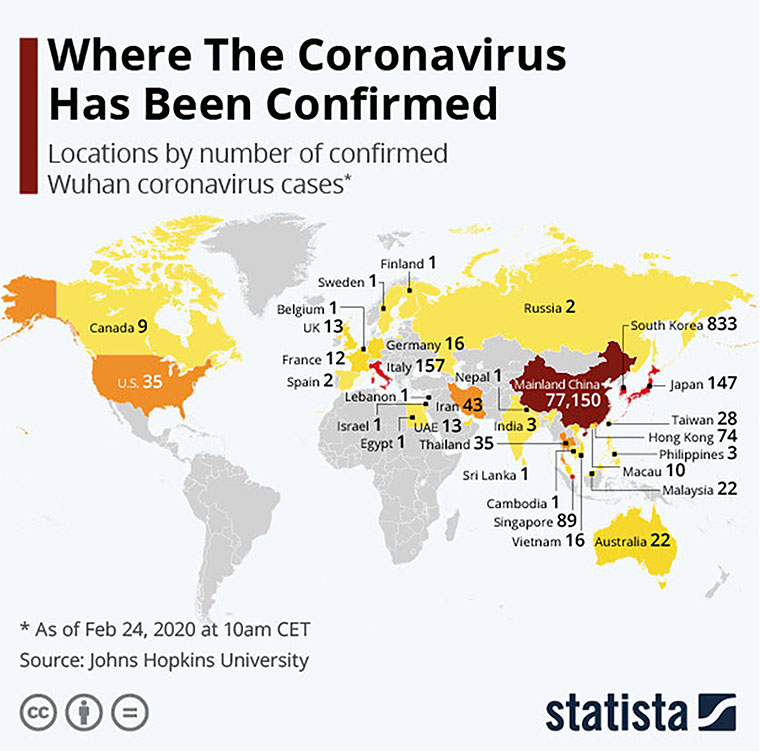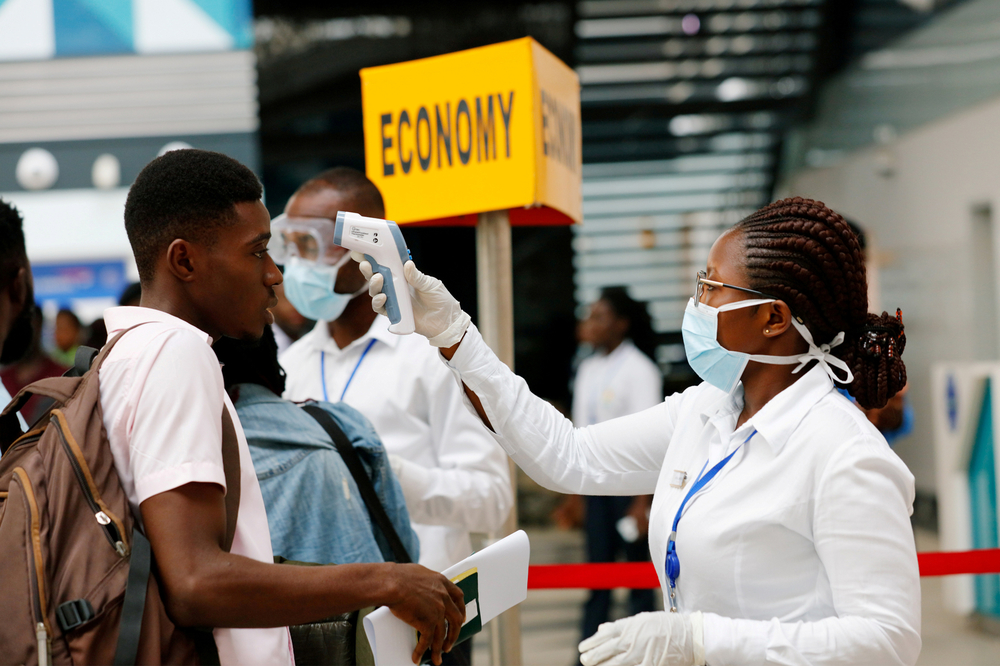MUKONO, Uganda/YAOUNDE, Cameroon/JOHANNESBURG, South Africa – When Margaret Ntale Namusisi’s three daughters called her in Uganda to say they were being quarantined at their university in Wuhan, China, because of the coronavirus outbreak, she sent money and told them: “Run very fast and buy food.”
Valeria, Veronica and Vivian did just that. But nearly one month on, with no help from their government, they are now under lockdown in a crowded apartment with orders to stay indoors with the windows closed. Food, funds and morale are running low.
“They are traumatised,” said Namusisi, who wakes up at 3AM every day to talk to her daughters over the Chinese messaging service WeChat. “They ask, has Uganda given up on us?”
There are an estimated 4,600 students from African countries studying in Hubei province where the capital city of Wuhan has become the ground zero for the deadly virus’ spread, according to Development Reimagined, an international development consultancy in Beijing. But there are also other African nationals in Hubei province outside the academic community.
In recent years, many African countries have seen a large increase in travel to China of their citizens and from Chinese visitors. China now has more African students than the United States or the United Kingdom.
Countries across the world have flown their nationals home from the quarantined Hubei province, the centre of the outbreak of the virus that since January had infected more than 80,350 people and killed over 2,700 by February 25.
But no sub-Saharan African country has done so, leaving thousands stranded.
“We’ve gone to parliament, we’ve gone to the ministry of health, we’ve gone to the ministry of foreign affairs and taken them our petition to bring back our children,” said Namusisi, nearing tears.
Reuters spoke to families from Cameroon, Uganda, Senegal and Ethiopia with similar tales of frustration. Many have set up associations to pressure their governments to act, through letters and petitions.
Governments across Africa have said they plan to send money to students to help with expenses. Cameroon said it was sending about US$82,000 to help its citizens stuck in Hubei.
However, many including Senegal and Uganda, say they do not have the resources to look after coronavirus patients at home and their nationals would be safer in China where authorities have reported a dramatic drop in new cases in Hubei.
While Uganda said last week that it would send US$61,000 to students stuck in Wuhan, the Namusisi sisters have received nothing so far.
They survive on one meal a day of noodles or rice, their mother said. Other foods are now too expensive: one kilo of beef costs US$13, one tomato a dollar.
They are not alone. Dagmawi Demelash Mengistu, a business student from Ethiopia, said his school has provided latex gloves and masks, but his government has not responded to students’ calls to be flown home.
He too is locked inside, short of food and money.
“We have seen one plane come for four students in Wuhan to evacuate them, just one plane,” said Mengistu who is part of a student association that has asked the Ethiopian embassy to fly them home.
“Ethiopian airlines haven’t stopped flights from China … so that is a shot to the gut when you see they are still continuing flights but cannot take their citizens out.”
Ethiopian authorities did not respond to requests for comment.

South Africa’s International Relations Minister Naledi Pandor claimed they had established contact with their citizens in Hubei who told them they felt safe, and there was no clamour to return home.
“They indicate that they are being looked after by the institutions that they are attached to. They say they are being looked after, they are in safe conditions, provided with food, they have accommodation…,” Pandor said.
“I am not sure where this idea of a desperate group that wants to come back comes from.”
But Duane Msimanga, a fourth-year engineering student at Hubei University of Technology, says they feel abandoned by the government. Msimanga was due to graduate in June, around the same time his student visa expires, and now he is in limbo, not sure when the nightmare will end.
“I’m basically indoors all day, just watching movies and playing games online, trying to distract myself from the fact that I can’t go outside. It’s become a lot harder to find any open shops or ones with adequate stock,” he said.
“All I want is to go home, but the (South African) government is so far not offering us a path out. The communication hasn’t been great and it’s quite frustrating.”
Many African nations are nervous about a little-known virus breaching their borders.
Ebola killed over 11,000 people in West Africa between 2013 and 2016. An ongoing outbreak in Democratic Republic of Congo has killed over 2,300.
Health officials say those epidemics have prepared countries to keep coronavirus from spreading and the World Health Organisation says 24 African nations can test for potential cases. Airport screening and monitoring procedures have already highlighted possible coronavirus cases across the continent.
The Africa Centre for Disease Control and Prevention last week called on governments to bring Africans home. But this has provided little comfort for those stranded in China or their families back home who have received little or no communication from their governments.
Roger-Michel Kemkuining, a Cameroonian, found out that his student son Pavel had contracted coronavirus from a statement posted online by Yangzte University, where Pavel was studying.
The statement, seen by Reuters, said the university had informed the Cameroonian embassy and the parents, but that was news to Kemkuining.
Cameroon’s health ministry spokesman, Clavere Nken, confirmed that the family had found out via social media. He said he had since spoken to them by phone. Yangzte University did not immediately respond to a request for comment.
Pavel is the only known African to test positive for coronavirus. He has recovered and was released from hospital on February 10 but remains in isolation.
For his father, the situation still rankles.
Seeing the statement was “like a lightning strike,” he told Reuters at his home in Yaounde. “I was really dejected.”
What is Covid-19 – the illness that started in Wuhan?
It is caused by a member of the coronavirus family that has never been encountered before. Like other coronaviruses, it has come from animals. Many of those initially infected either worked or frequently shopped in the Huanan seafood wholesale market in the centre of the Chinese city.
What are the symptoms this coronavirus causes?
The virus can cause pneumonia. Those who have fallen ill are reported to suffer coughs, fever and breathing difficulties. In severe cases there can be organ failure. As this is viral pneumonia, antibiotics are of no use. The antiviral drugs we have against flu will not work. Recovery depends on the strength of the immune system. Many of those who have died were already in poor health.
Should I go to the doctor if I have a cough?
The ministry of health is advising anyone who has travelled to Zimbabwe from mainland China, Thailand, Japan, Republic of Korea, Hong Kong, Taiwan, Singapore, Malaysia or Macau in the last 14 days and who is experiencing a cough or fever or shortness of breath to stay indoors and call 999 or 112 from Econet lines and 114 from NetOne lines, even if symptoms are mild.
Is the virus being transmitted from one person to another?
China’s national health commission has confirmed human-to-human transmission, and there have been such transmissions elsewhere.
How many people have been affected?
As of 25 February, the outbreak has affected 80,000 people globally. In mainland China there have been 2,663 deaths among 77,658 cases, mostly in the central province of Hubei. More than 12,000 people affected in China have already recovered.
The coronavirus has spread to at least other 30 other countries. The most badly affected include Japan, with 850 cases, including 691 from a cruise ship docked in Yokohama, and four deaths. Italy has recorded 229 cases and seven deaths, while South Korea has recorded 893 cases and eight deaths. There have also been deaths in Hong Kong, Taiwan, UK, France, Iran and the Philippines. There has been only one recorded case in Egypt on the African continent.
Why is this worse than normal influenza, and how worried are the experts?
We don’t yet know how dangerous the new coronavirus is, and we won’t know until more data comes in. The mortality rate is around 2% in the epicentre of the outbreak, Hubei province, and less than that elsewhere. For comparison, seasonal flu typically has a mortality rate below 1% and is thought to cause about 400,000 deaths each year globally. Sars had a death rate of more than 10%.
Another key unknown is how contagious the coronavirus is. A crucial difference is that unlike flu, there is no vaccine for the new coronavirus, which means it is more difficult for vulnerable members of the population – elderly people or those with existing respiratory or immune problems – to protect themselves. Hand-washing and avoiding other people if you feel unwell are important. One sensible step is to get the flu vaccine, which will reduce the burden on health services if the outbreak turns into a wider epidemic.
Have there been other coronaviruses?
Severe acute respiratory syndrome (Sars) and Middle Eastern respiratory syndrome (Mers) are both caused by coronaviruses that came from animals. In 2002, Sars spread virtually unchecked to 37 countries, causing global panic, infecting more than 8,000 people and killing more than 750. Mers appears to be less easily passed from human to human, but has greater lethality, killing 35% of about 2,500 people who have been infected.
Is the outbreak a pandemic and should we panic?
No. A pandemic, in WHO terms, is “the worldwide spread of a disease”. The spread of the virus outside China is worrying but not an unexpected development. The WHO has declared the outbreak to be a public health emergency of international concern. The key issues are how transmissible this new coronavirus is between people, and what proportion become severely ill and end up in hospital. Often viruses that spread easily tend to have a milder impact. Generally, the coronavirus appears to be hitting older people hardest, with few cases in children.
















